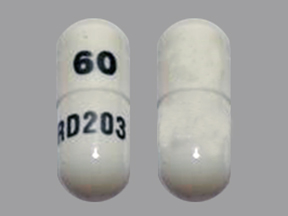
Inderal La Coupons & Savings Card – Discount Prices from $25.32
Brand for: Propranolol er
My prescription
Edit
60MG, Propranolol ER (90 Capsule Extended Release 24 Hours)
Select pharmacy

CVS
$33.57
COUPON PRICE
Walmart
$25.32
COUPON PRICE
Albertsons
$31.02
COUPON PRICE
Walgreens
$35.19
COUPON PRICEInderal La savings card
Show this card to your pharmacist
Walmart
$25.32
BIN
ID
PCN
GRP
019876
LH2D76E741
CHIPPO
LHX
Powered by
More prescriptions for migraine
More prescriptions for migraine
Price history for Inderal La (brand) & Propranolol ER (generic)
90 Capsule Extended Release 24 Hours, 60MG
Average retail price for Inderal La
Average retail price for Propranolol ER
Average SaveHealth price for Propranolol ER
Our price history data is based on aggregated prescription data collected from participating pharmacies in America. Our prescription data updates daily to reflect the latest price changes. If you notice a missing data point, it means there wasn't sufficient data available to generate a monetary value for that date.
Over the last 12 months, the average discount price of Inderal La is $23.96 using the SaveHealth savings card. That's an average savings of 99.65% on Inderal La with our discount card.
*Retail prices are based on pharmacy claims data, and may not be accurate when we don't have enough claims.
Inderal La (Propranolol ER) dosage forms
Dosage Quantity Price from Per unit 60MG 90 Capsule Extended Release 24 Hours $25.32 $0.28 60MG 1 Capsule Extended Release 24 Hour $2.68 $2.68 60MG 30 Capsule Extended Release 24 Hours $7.94 $0.27 60MG 100 Capsule Extended Release 24 Hours $27.13 $0.27 60MG 500 Capsule Extended Release 24 Hours $80.20 $0.16 60MG 1000 Capsule Extended Release 24 Hours $134.10 $0.13 80MG 1 Capsule Extended Release 24 Hour $2.71 $2.71 80MG 30 Capsule Extended Release 24 Hours $8.82 $0.29 80MG 90 Capsule Extended Release 24 Hours $27.97 $0.31 80MG 100 Capsule Extended Release 24 Hours $30.08 $0.30
| Dosage | Quantity | Price from | Per unit |
|---|---|---|---|
| 60MG | 90 Capsule Extended Release 24 Hours | $25.32 | $0.28 |
| 60MG | 1 Capsule Extended Release 24 Hour | $2.68 | $2.68 |
| 60MG | 30 Capsule Extended Release 24 Hours | $7.94 | $0.27 |
| 60MG | 100 Capsule Extended Release 24 Hours | $27.13 | $0.27 |
| 60MG | 500 Capsule Extended Release 24 Hours | $80.20 | $0.16 |
| 60MG | 1000 Capsule Extended Release 24 Hours | $134.10 | $0.13 |
| 80MG | 1 Capsule Extended Release 24 Hour | $2.71 | $2.71 |
| 80MG | 30 Capsule Extended Release 24 Hours | $8.82 | $0.29 |
| 80MG | 90 Capsule Extended Release 24 Hours | $27.97 | $0.31 |
| 80MG | 100 Capsule Extended Release 24 Hours | $30.08 | $0.30 |
| 80MG | 500 Capsule Extended Release 24 Hours | $88.45 | $0.18 |
| 80MG | 1000 Capsule Extended Release 24 Hours | $150.60 | $0.15 |
| 120MG | 30 Capsule Extended Release 24 Hours | $8.82 | $0.29 |
| 120MG | 90 Capsule Extended Release 24 Hours | $27.97 | $0.31 |
| 120MG | 100 Capsule Extended Release 24 Hours | $30.08 | $0.30 |
| 120MG | 500 Capsule Extended Release 24 Hours | $106.20 | $0.21 |
| 120MG | 1000 Capsule Extended Release 24 Hours | $186.10 | $0.19 |
| 160MG | 90 Capsule Extended Release 24 Hours | $42.49 | $0.47 |
| 160MG | 100 Capsule Extended Release 24 Hours | $46.21 | $0.46 |
| 160MG | 500 Capsule Extended Release 24 Hours | $129.70 | $0.26 |
| 160MG | 1000 Capsule Extended Release 24 Hours | $233.10 | $0.23 |
What is Inderal LA used for?
Inderal LA is used to treat high blood pressure, angina (chest pain), and certain types of irregular heartbeats. It is also used to prevent migraines and to improve survival after a heart attack.
Why is Inderal LA discontinued?
Inderal LA, a long-acting formulation of propranolol, was discontinued due to business reasons rather than safety or efficacy concerns. This decision was made by the manufacturer and is not related to any issues with the medication itself. Patients who were using Inderal LA are advised to consult their healthcare provider for alternative treatment options.
Does Inderal LA cause weight gain?
Inderal LA (propranolol) can potentially cause weight gain in some individuals. Weight gain is a known side effect of beta-blockers, including Inderal LA, although it may not occur in everyone. If there are concerns about weight changes while taking this medication, it is advisable to consult with a healthcare provider for further evaluation and guidance.
Does Inderal LA make you sleepy?
Inderal LA (propranolol) can cause drowsiness or fatigue as a side effect in some individuals. It is important for patients to monitor how they feel after taking the medication and discuss any concerns with their healthcare provider.
